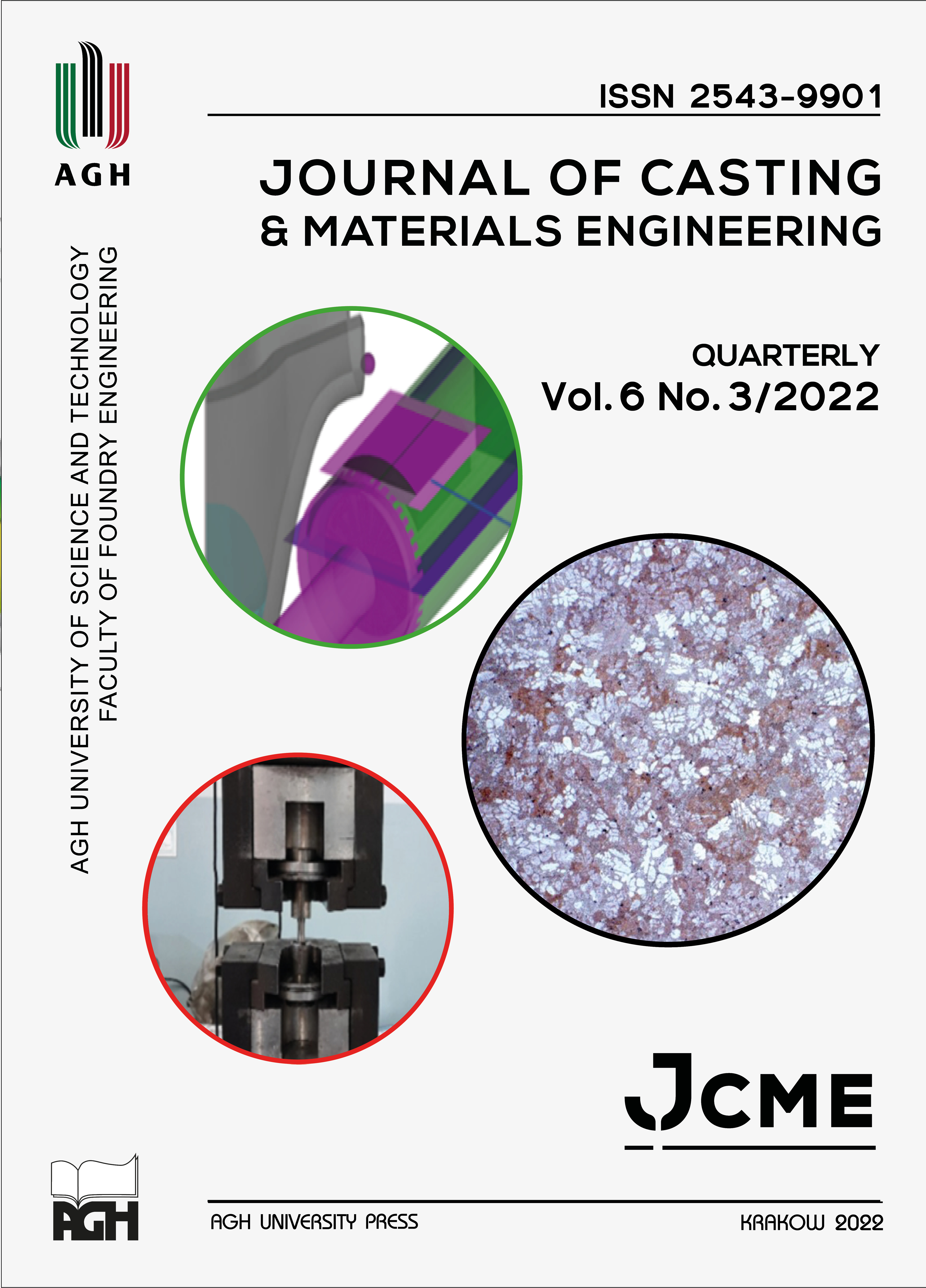The Effect of High Silicon and Molybdenum Content on the Mechanical Properties and Microstructure of Gray Cast Iron
DOI:
https://doi.org/10.7494/jcme.2022.6.3.64Abstract
This paper presents an overview of the current knowledge concerning SiMo ductile cast iron begins by describing the standard type of ductile cast iron before proceding to description of its microstructures. The paper then presents its chemical composition and the significant influence of individual elements on technological and mechanical properties. The research section focuses the influence of the addition of Si and Mo to the matrix of gray iron. After casting, stepped samples were carried out on the microstructure along with UTS tensile strength tests. The research presented in the article is a preliminary step towards the goal of obtaining a stable production process for silico-molybdenum cast iron.
Downloads
References
Lekakh S.N., Buchely M., O’Malley R., Godlewski L. & Mei Li. (2021). Thermo-cycling fatigue of SiMo ductile iron using a modified thermo-mechanical test. International Journal of Fatigue, 148, 106218. Doi: https://doi.org/10.1016/j.ijfatigue.2021.106218.
Castro Güiza G.M., Hormaza W., Galvis E.A.R. & Mendez Moreno L.M. (2017). Bending overload and thermal fatigue fractures in a cast exhaust manifold. Engineering Failure Analysis, 82, 138–148. Doi: https://doi.org/10.1016/j.engfailanal.2017.08.016.
Karnik A.Y. & Shelby M.H. (2010). Effect of Exhaust Gas Temperature Limits on the Peak Power Performance of a Turbocharged Gasoline Engine. Journal of Engineering for Gas Turbines and Power, 132(11), 112801. Doi: https://doi.org/10.1115/1.4000856.
Rathnaraj D.J. (2012). Thermomechanical fatigue analysis of stainless steel exhaust manifolds. International Journal of Engineering, Science and Technology, 2(2), 265.
Black B., Burger G., Logan R., Perrin R. & Gundlach R. (2002). Microstructure and Dimensional Stability in Si-Mo Ductile Irons for Elevated Temperature Applications. SAE Technical Paper. 2002-01-2115. Doi: https://doi.org/10.4271/2002-01-2115.
Dorula J., Kopyciński D., Guzik E., Szczęsny A. & Gurgul D. (2021). The Influence of Undercooling ΔT on the Structure and Tensile Strength of Gray Cast Iron. Materials, 14(21), 6682. Doi: https://doi.org/10.3390/ma14216682.
Dawi K., Favergeon J. & Moulin G. (2008). High Temperature Corrosion of the Si-Mo Cast Iron in Exhaust Atmosphere. Materials Science Forum, 595–598, 743–751. Doi: https://doi.org/10.4028/www.scientific.net/msf.595-598.743.
Standard EN 16124:2012. Founding – Low-alloyed ferritic spheroidal graphite cast irons for elevated temperature applications.
Çelik G.A., Tzini M.-I.T., Polat Ş, Aristeidakis J.S., Atapek Ş.H., Sarafoglou P.I. & Haidemenopoulos G.N. (2021). Simulation and analysis of the solidification characteristics of a Si-Mo ductile iron. Journal of Mining and Metallurgy Section B: Metallurgy, 57(1), 53–62. Doi: https://doi.org/10.2298/JMMB200717003C.
Vaško A. (2020). Comparison of mechanical and fatigue properties of SiMo- and SiCu-types of nodular cast iron. Materialstoday: Proceedings, 32(2), 168–173. Doi: https://doi.org/10.1016/j.matpr.2020.04.184.
Åberg L.M. & Hartung C. (2012). Solidification of SiMo Nodular Cast Iron for High Temperature Applications. Indian Institute of Metals. Transactions of the Indian Institute of Metals, 65(6), 633–636. Doi: https://doi.org/10.1007/s12666-012-0216-8.
Matteis P., Scavino G., Castello A. & Firrao D. (2014). High temperature fatigue properties of Si-Mo Ductile Cast iron. Procedia Materials Science, 3, 2154–2159. Doi: https://doi.org/10.1016/j.mspro.2014.06.349.
Górny M., Kawalec M., Gracz B. & Tupaj M. (2021). Influence of Cooling Rate on Microstructure Formation of Si-Mo Ductile Iron Castings. Metals, 11(10), 1634. Doi: https://doi.org/10.3390/met11101634.
Angella G., Taloni M., Donnini R. & Zanardi F. (2022). The Correlation between Solidification Rates, Microstructure Integrity and Tensile Plastic Behaviour in 4.2 wt.% Silicon Strengthened Ductile Iron. Journal of Casting & Materials Engineering, 6(1), 1–8. Doi: https://doi.org/10.7494/jcme.2022.6.1.1.
Dyrlaga Ł., Kopyciński D., Guzik E. & Szczęsny A. (2021). Struktura i właściwości żeliwa odpornego na działanie wysokiej temperatury oraz na zużycie ścierne. In: J.J. Sobczak (red.), Metalurgia 2020, 326–343.
Mourad M., El-Hadad S. & Ibrahim M.M. (2015). Effects of Molybdenum Addition on the Microstructure and Mechanical Properties of Ni-Hard White Cast Iron. Transactions of the Indian Institute of Metals, 68, 715–722. Doi: https://doi.org/10.1007/s12666-014-0504-6.
Kashani S.M. & Boutorabi S.M.A. (2009). As-Cast Acicular Ductile Aluminum Cast Iron. Journal of Iron and Steel Research International, 16(6), 23–28. Doi: https://doi.org/10.1016/S1006-706X(10)60022-2.
Gilewski R., Kopyciński D., Guzik E. & Szczęsny A. (2021). An Evaluation of the Microstructure of High-Aluminum Cast Iron in Terms of the Replacement of Aluminum Carbide with Titanium Carbide or Tungsten Carbide. Applied Sciences, 11(20), 9527. Doi: https://doi.org/10.3390/app11209527.
Gilewski R., Kopyciński D., Guzik E. & Szczęsny A. (2021). Shaping the Microstructure of High-Aluminum Cast Iron in Terms of the Phenomenon of Spontaneous Decomposition Generated by the Presence of Aluminum Carbide. Materials, 14(20), 5993. Doi: https://doi.org/10.3390/ma14205993.
Downloads
Published
Issue
Section
License
Copyright (c) 2022 Łukasz Dyrlaga, Dariusz Kopyciński, Edward Guzik, Grzegorz Soból, Dariusz Borak

This work is licensed under a Creative Commons Attribution 4.0 International License.
How to Cite
Accepted 2022-09-30
Published 2022-10-01


